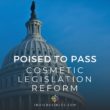I love being in business for myself. When I started my now-closed cosmetics business in the mid-1990's, the world was wide open for entrepreneurs from all walks of life. You could start a business doing anything. A few years later when the Internet made its way to Main Street, not only could you start a business, but you could actually expand one by taking it national or worldwide. These are exciting times, made possible by the Internet and the creativity, innovation and tenacity of the people who are putting it to good use.
But despite all of this wonderment, there's a big point that most people are missing. Even though the Internet is making it possible for “everyman and everywoman” to be an entrepreneur, political forces are slowly conspiring to squash the American dream. It happened last year with the Consumer Product Safety Improvement Act of 2008, which put thousands of tiny toy companies out of business because of the behavior of a few companies that were not careful about the components they made their toys with.This country is founded on the truth that all people have the right to pursue happiness, and this includes the right to use your talents, gifts and other blessings to provide for yourself and your family. The ability to do that by starting a small business in a home, garage or local manufacturing area is now threatened by people who simply don't understand that America must accommodate a new kind of “small” small business owned not by traditional corporate leaders, but by “consumer-business owners. Here are some of the reasons why this is important.
America's Administrative Agencies and Laws
The United States Small Business Administration was formed in 1953 to “aid, counsel, assist and protect the interests of small business concerns.”
President Obama recently signed a bill creating the Consumer Financial Protection Bureau to protect consumers from abusive financial products. (Read more about the new agency in the Wall Street Journal.)
He is also trying to push the new Small Business Jobs Act through the Senate. This legislation would eliminate capital gains taxes for some small business investments and create a $30 billion Small Business Lending Fund for community banks. (Reported on CNN.)
Congress is cutting into its summer recess to return to Washington tomorrow to vote on a $26 billion jobs bill that supporters say will save the jobs of as many as 145-thousand teachers and other public workers. (Reported in The Washington Post.)
The stated missions are great, but who's looking out for what I call “consumer-business owners?”
What Is A Consumer-Business Owner?
I first publicly used the term, “consumer-business owner” last year in this letter to the Chairman of the Federal Trade Commission. The term encompasses consumers in the traditional sense, but it also encompasses consumers who are small business owners — so “small” that they are not effectively captured by the mission of the SBA or any other US regulatory or administrative body.
Consumer-business owners are the new kids on the block. We are wholly consumers and wholly business owners, yet we are not just either of them. Instead, we are a self-contained intersection between the two.
We are consumers because we have jobs. We have jobs because we created them.
This is a critical distinction between us and other consumers — we don't work for someone else. The difference between us and other consumers is that we created our jobs, while traditional consumers were given a job by someone else.
Our businesses are our jobs! We created our jobs and we own them, and American policy makers and lawmakers don't really know we exist. This makes us unique, even new, in the American economy, and the system is simply not set up to deal with the issues we face.
We're half breeds, and our elected officials either don't know about us or, if they do, they don't know what to do with us.
Small, Is Not
The SBA defines “small” businesses largely to determine what companies can and cannot take advantage of in terms of government set asides and exemptions from requirements that “non-small” companies must follow. A cosmetics company grossing $7M a year is considered “small” by the SBA! How many “small” business owners do you know leading companies grossing that much on an annual basis?
What President Obama Considers “Small”
Take a look at the types of “small” businesses President Obama visits on his trips from state to state to promote his agenda. According to published reports like this one, he chooses who to visit by looking at a list of local business owners who had recently taken out small business loans through an SBA loan program.
It's great that he's promoting local businesses, but consumer-business owners rarely if ever take out small business loans. They finance their companies through a traditional job (full- or part-time), gifts or low- or no- interest loans from friends and family members, their savings and retirement plan accounts and whatever credit they can get on a consumer credit card. They are not looking to become rich, public trade stock or open chains of franchise locations. They just want to take care of themselves and their families and create a profitable asset that allows them to generate enough income to expand their professional horizons and perhaps retire comfortably.
(For a story reiterating how opposed consumer business owners are to small business loans, even with President Obama's new plans, read this story about entrepreneurs Erics Duignan Minnhan and Susan Reiner, who “wouldn't take out a bank loan if President Obama delivered it on a silver platter.”
That may have made sense in 1953 when the SBA was formed, but today, there is a new kind of “small” business. It's bigger than Mom & Pop largely because the Internet and other new technologies allow Mom & Pop to expand beyond their geographical location. The Mom & Pop of yesterday was limited in terms of growth because it could not really sell anything beyond its immediate area.
Today, Mom & Pop can expand across multiple state borders, and even countries, and still qualify as Mom & Pop. These types of businesses are managed by people who will never gross $7M a year. They may never even gross $1M a year. But even so, they are successful. They are living good lives, raising their children saving for the future, paying for the own health insurance, putting their kids through college, paying mortgages off, paying their taxes and contributing to the local tax base.
Current Policy Does Not Address Consumer Business Onwers
So, the SBA is looking out for small businesses that are not really small at all.
The new Consumer Financial Protection Bureau will look out for consumers who might be duped by financial institutions when it comes to buying a home, auto and other consumer products.
The Small Business Jobs Act will look out for employees who work a traditional 9 to 5 job at a business owned by someone else.
And Congress is cutting its vacation tomorrow to look out for teachers and other public workers in cash-strapped states.
Who's Looking Out For Consumer Business Owners?
Who is looking out for the cash-strapped consumer-business owner? I think no one is, and that's how CPSIA became law with no one paying attention.
* Toys: Lawmakers thought they were curbing the behavior of a few big companies, but it turns out they were passing new laws that made the Consumer Product Safety Commission (the agency charged with promulgating rules under the CPSIA) take actions that forced consumer-business owners toy makers out of business.
* Bloggers: Something similar is happening to this nation's bloggers, most of whom are consumer-business owner bloggers and not big companies, but which must nevertheless comply with the same FTC's Guides Concerning the Use of Endorsements and Testimonials in Advertising that multi-billion dollar companies must comply with — even though the FTC apparently is not really concerned with the impact of tiny “individual bloggers.”
* Cosmetics: The same thing could happen in the cosmetics arena with H.R. 5786. If that law passes, thousands of consumer-business owner cosmetics companies will be put out of business by a well-meaning law designed to curb the behavior of certain companies, but not the ones owned by consumer-business owners.
What's next?
Consumer-business owners are getting lumped in with everyone else, even though they are not similarly situated. Sound public policy demands that companies making 1,000 lip balms every sixty seconds be regulated differently than companies making 1,000 lip balms a year. Same for toys and people maintaining blogs on their own or with a few guest bloggers now and then.
Don't you think?
There's No Box For Us
We don't fit into a box. We are not categorized according to traditional categories. We're the new kids on the block, and Congress and everyone is busy passing laws that completely overlook us.
A consumer-business owner's business is his or her job. Passing a law that forces them to lose their job because they have to close their business is not necessary to protect the public.
What To Do?
Well, now, ain't that the million dollar question! And I don't know the answer. But I do think it's an issue, and I'm wondering if you do too.
Question: Are you a consumer-business owner, or do you know someone who is? What do you think our nation should do from a policy perspective to ensure our seat at the table?



